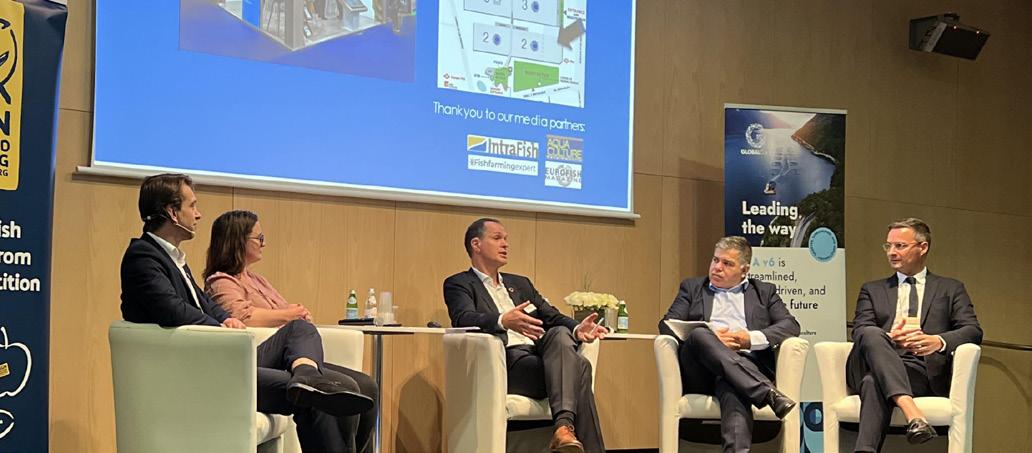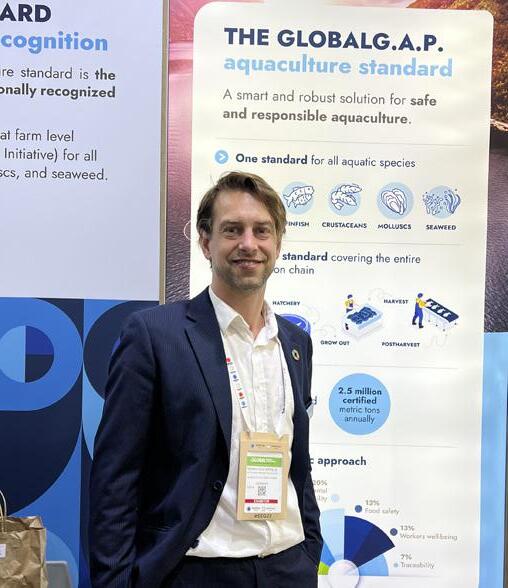
5 minute read
Addressing responsible sourcing of feed materials
Atthe 2023 Seafood Expo Global held in Barcelona from April 25-27, GLOBALG.A.P. hosted its annual conference. This year, it was on “Addressing Responsible Sourcing of Feed Materials”. Dr Kristian Moeller, Managing Director and Remko Oosterveld, Key Account Manager Aquaculture, led the discussions. They were joined on stage by Caroline Brunias, Sales Manager at Metro Food Sourcing, Leonidas Papaharisis, Quality Assurance/ Sustainability Director at Avramar, and Óscar Vidal, Fish & Aquaculture Director at Bureau Veritas.
GLOBALG.A.P. has attained 20 years as a certification program owner. Its aquaculture certification program now covers 3 million tonnes of farmed aquatic species from 28 countries since 2011 to early 2023. Salmon is the leading species followed by rainbow trout, vannamei shrimp, European seabass, gilthead bream and coho salmon. Certification of seaweed will soon follow.
The discussion began by highlighting the new versions of a number of GLOBALG.A.P. solutions, including the Integrated Farm Assurance (IFA) standard version 6 for aquaculture, the Compound Feed Manufacturing (CFM) standard version 3.1, and the Risk Assessment on Social Practices (GRASP) add-on version 2. The new versions of these solutions are complete overhauls of the aquaculture certification program and will become obligatory in January 2024.
With regards to animal welfare, the aim is to improve the best practices in shrimp aquaculture. From April 2024, only post larvae originating from non-ablated broodstock will be accepted.
On the responsible sourcing of feed materials in the Compound Feed standard, by January 2024, the requirements will become more demanding. From 2024 onwards, there shall be established levels of fishmeal originating from verified sources via third party accredited schemes. In addition, fishmeal and fish oil should not originate from illegal, unreported and unregulated fishing, and from any species that are classified as critically endangered or endangered in the IUCN Red List (www.iucnredlist. org). Soy and palm oil have their own specific criteria.

Moeller and Oosterveld placed special emphasis on the key sustainability aspects which are currently “top-ofmind” with consumers, NGOs and retailers. They stressed that implementing animal welfare practices is not only an ethical responsibility, but that it has also been shown to increase the efficiency of resource use, thereby improving sustainability. Animal welfare criteria have been completely overhauled in GLOBALG.A.P. certified value chains. These changes will become obligatory in January 2024.
Improving social governance, specifically in the form of supply chain due diligence, was another key topic at the conference. The GLOBALG.A.P. Secretariat has tightened social governance principles and criteria at feed manufacturer and farm level to support both buyers and suppliers. The GRASP add-on has undergone significant improvements and has become a powerful tool to give family businesses, buyers and suppliers the opportunity to demonstrate their respect for human and labour rights in the aquaculture market.
Growing adoption of the GGN label adds visibility to responsibly farmed seafood
The GGN label is the business-to-consumer initiative that was launched in 2016 and has now acquired a global reach. Consumers can now find seafood products with the GGN label across Europe and North America and retailers in Asia are now beginning to adopt the label as well.
Brunias introduced the Metro Chef brand marketed by Metro Food Sourcing, which will include salmon, turbot, seabass and seabream with the GGN label. “The GGN label helps our customers understand that we source farmed fish from responsible and trustworthy sources,” said Brunias. “The seabass and seabream with the GGN label to be sold under the Metro Chef brand will be sourced from Avramar, the largest fully integrated aquaculture company in the Mediterranean region. It has 65 farms, 10 of them in Greece and Spain and produces approximately 80,000 tonnes annually. It has three feed mills and its biggest challenge is sourcing feed ingredients,” said Papaharisis.
Constant adaptation to meet current challenges in the aquaculture industry

There are updates on the portfolio of tools and solutions to respond proactively to the constantly evolving challenges facing the aquaculture industry. The changes to the GLOBALG.A.P. solutions as discussed in the conference aim to improve sustainability in aquaculture and provide the meaningful assurance of responsible aquaculture that today’s discerning consumers demand.
Q&A with Remko Oosterveld on challenges with certification in Asia
What has been the demand for certified shrimp and fish from Asia over the past year (i.e., post Covid)? Asian aquaculture producers focus on the export market and that basically is driving certification. We do not see any difference in export volumes, before and post Covid. Notwithstanding the certification body, we do not see an increase in demand. However, we do experience more interest in certification from local retailers, which is a great and promising development.
What have been the major challenges for small farms in Asia to achieve certification, i.e., what have been the barriers, other than costs.
We try to be as cost-effective as possible, but as you know, there will always be costs associated with certification, such as onsite verification, but also the implementation of our criteria.
Earlier today, we discussed Indonesia’s case with a consultant from the government, where they want to implement our certification and the feed standards. Certification requires commitment throughout the supply chain, as it requires all steps of the production chain to be certified and all involved stakeholders will need to be aligned. The assurance we provide builds on a strong management system; this is feasible for all producers regardless of size but will require resources and commitment to develop and implement.
Another aspect of certification is the implementation of individual criteria, such as responsible sourcing of feed materials. As an example, fishmeal and fish oil will need to be sourced from a certain level of third party certification or fishery improvement projects (FIP). Although this would limit purchasing flexibility, it will drive management of fisheries to be more responsible and with that protect the livelihoods of people that are dependent on fisheries as a means of employment or as food source.
At the national level, I believe there is more interest in sustainability. GLOBALG.A.P. provides assurance and motivation to do the right thing. It is very promising to see that markets throughout the world start to realise the benefits that certification can bring. Costs associated with certification will be rewarded by more efficient production, market access and an improved image.
In some countries, the government specifies certification to the local standard before moving to third party international brands. What are your thoughts on this? Indeed, governments, are becoming more interested because they realise that sustainability is rewarding and that we cannot continue depleting our finite resources. Also, certification is a means to attract investors and is a condition for financial support. We are supportive of governments adopting local standards by producers. Local standards allow producers to become familiar with certification “How does it work? What do I need to consider?”, before adopting more ambitious standards.
I say this because getting a GlobalGap certification requires a lot of work. Therefore, it is good to have everybody on the same page. The feed manufacturer, hatchery and farm etc need to be certified, and criteria such as those related to food safety, animal welfare, animal health, environment, social aspects and so on, need to be incorporated.
Setting up a certification program is not easy; governments need to be aware of its challenges, because certification is built on trust and integrity. If integrity fails and a certificate can be bought online, it loses its credibility. I must say that certain criteria within our certification program are very beneficial, such as risk assessments on food safety and the impact on the environment.










